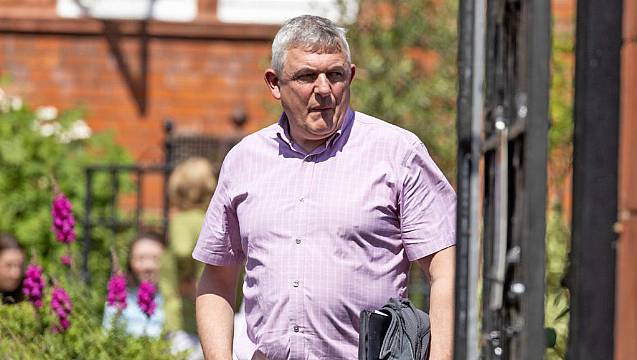A senior prison official has admitted that the death of a prisoner on enhanced status from a heroin overdose on a wing in Wheatfield Prison with no history of drug problems was “unusual.”
Thomas Stokes (23) with an address at a halting site at Oldcastle Park Lawns, Clondalkin, Co Dublin, was found unresponsive in his cell in Wheatfield Prison on the morning of September 16th, 2017.
Mr Stokes, who was the youngest of a family of 11 children, was subsequently pronounced dead the following day at Tallaght University Hospital.
The deceased inmate had been serving a four-and-a-half-year prison sentence for a series of robberies of shops and businesses over a 10-day period in the Clondalkin area in July 2016.
A court heard that Mr Stokes’s crimes had been motivated because of his need to discharge a drug debt after his family had been threatened.
The inquest heard that a postmortem confirmed that the prisoner died as a result of a lack of oxygen to the brain due to a heroin overdose.
The assistant governor of Wheatfield, Joseph Hernon, told a sitting of Dublin District Coroner’s Court on Monday that drugs were a problem across all prisons in Ireland.
However, Mr Hernon said there was no problem with drugs at the time on the landing where Mr Stokes had been kept within Wheatfield.
He explained that the wing was used to house prisoners on enhanced status so that the death of an inmate from that area of the prison from a heroin overdose “would have been unusual.”
The inquest heard no evidence of any drugs had been found in the deceased’s cell.
However, Mr Hernon confirmed that daily searches would be carried out in all parts of the prison to check for drugs.
In reply to questions from the coroner, Clare Keane, the assistant governor said he believed heroin was in less use in prisons now compared to seven years ago.
Although he had no figures to substantiate his claim, Mr Hernon said he felt there was now “more pill use” by prisoners as they regarded heroin as “a dirtier drug.”
He acknowledged that drugs remained a widespread problem across the prison population but added that the Irish Prison Service used “a mix of tools” to address the issue.
Mr Hernon also revealed that fewer nighttime checks were now carried out on prisoners over which there were no concerns compared to at the time of Mr Stokes’ death.
He explained there was a balance between the need to check on prisoners and their human right to privacy.
Following a report by the Inspector of Prisons into Mr Stokes’ death, Mr Hernon confirmed that low lighting was now used on landings at nighttime to ensure staff conducting checks on cells could be seen clearly on CCTV.
In reply to questions from jury members, Mr Hernon said he had “no idea” how the deceased had got access to heroin.
Two of Mr Stokes’ brothers who attended the hearing left the inquest before a verdict was delivered.
One of them, Martin Stokes, had earlier given evidence that his parents had visited his brother in prison the day before he was found unresponsive when he was in “very good form and humour.”
Mr Stokes said his brother did “a bit of drugs” but he had “not come across to us as taking drugs in prison.”
He claimed his family were “shocked” to be told by doctors in TUH that too much damage had been caused to his brother’s organs before he had been brought to hospital by prison staff.
The witness voiced claims, which the coroner classified as “hearsay,” that his family were told that his brother had been “screaming in his cell for help and he was ignored.”
He questioned why no prisoner officer had attempted to directly check on his brother when he had remained in the same position on his bed during the night.
A prison officer, Philip Neenan, said he had visibly checked on Mr Stokes once every hour during the night as required under IPS policy.
Mr Neenan said he had no need to open the prisoner’s door as he appeared to be sleeping and he had not noticed any issue of concern.
The prison officer said Mr Stokes’ personal call button in his cell had not been activated at any stage.
Mr Neenan confirmed he would have heard screaming if Mr Stokes had been looking for help.
The inquest heard evidence that the alarm was raised after the prisoner was unresponsive in his cell at 8:15am and he was brought to TUH by ambulance arriving at 9:33am.
The coroner was also informed Mr Stokes began breathing again following intervention by nursing staff at Wheatfield.
Counsel for the Irish Prison Service, Asim Sheikh BL, said he did not believe it could be said there had been any delay in attending to the prisoner.
Prison officer, Andrew Fitzpatrick, said prison staff faced a constant battle to stop drugs getting into Wheatfield.
Mr Fitzpatrick said drugs were either dropped by drones, thrown over the prison wall or smuggled into the prison.
In reply to questions from Dr Keane, Mr Fitzpatrick said the first thing prison staff usually think about if they find a prisoner unresponsive is drugs.
However, he said there had never been an issue in relation to drugs with Mr Stokes.
Mr Fitzpatrick pointed out that prisoners on enhanced status, like the deceased, tended to avoid issues that would result in a loss of privileges.
A jury of five females and one male returned a verdict of death by misadventure without making any recommendations.







